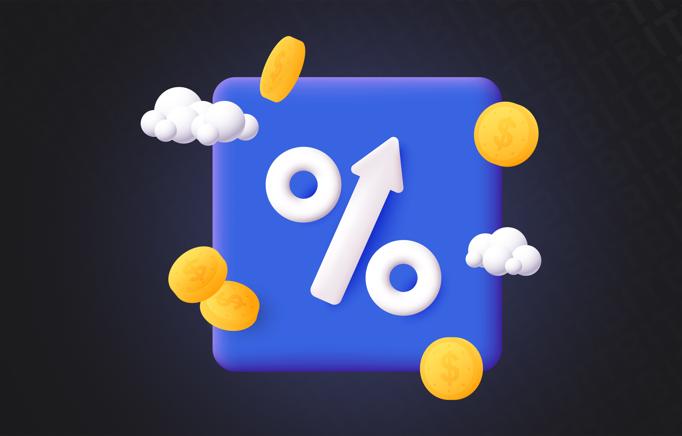What are interest rates
Crypto for Beginners
Other articles
An interest rate is either the cost of borrowing money or the incentive to save it. It is computed as a percentage of the borrowed or saved sum.
When you get a house mortgage, you borrow money from a bank. Other loans can be used to purchase a car, an appliance, or to pay for college. Banks borrow money from you in the form of deposits, and the interest they pay you is what you get in exchange for using the money you deposit. Deposit funds are used to finance loans. Borrowers are charged somewhat higher interest rates than depositors. The distinction is their profit. Because banks compete for both depositors and borrowers, interest rates remain within a small range of one another.
The interest rate is applied to the entire unpaid amount of your loan or credit card debt by the bank, and you must pay at least the interest in each compounding month. If you do not, even if you are making payments, your outstanding debt will grow. Although interest rates are quite competitive, they are not identical. A bank will demand a higher interest rate if it believes the debt will not be repaid. As a result, because revolving loans, such as credit cards, are more expensive to administer, banks will often charge a higher interest rate on them. Banks also charge higher lending rates to people they consider riskier, the better your credit score, the lower your interest rate.
Treasury note yields or the fed funds rate affect interest rates. The Federal Reserve establishes the federal funds rate as the short-term interest rate benchmark. The fed funds rate is the interest rate that banks charge each other for overnight borrowing. The demand for US Treasuries, which are sold at auction, determines Treasury note yields. Investors pay more for bonds when demand is high. As a result, their output is decreased. Interest rates on long-term bonds, such as 15-year and 30-year mortgages, are affected by low Treasury yields.
Depending if the interest rates are high or low, it has big effect on the economy.
Loans become more expensive when interest rates are high. When interest rates are high, fewer individuals and businesses can borrow. This reduces the quantity of credit available to support purchases, causing consumer demand to decline. Simultaneously, it encourages more individuals to save since they earn a higher return on their savings rate. High interest rates can decrease the amount of money available for corporate expansion, suffocating supply. This decrease of liquidity causes the economy to stall.
Interest rates that are too low have the opposite effect on the economy. Low mortgage rates have the same impact as lower property prices in terms of driving real estate demand. Savings rates are falling. When savers discover that they are receiving less return on their accounts, they may opt to spend more. They may also engage in somewhat riskier but more profitable investments, driving up stock values.
You might ask yourself, why wouldn't interest rates be maintained low all the time if they give so many benefits? The US government and the Federal Reserve, for the most part, want low interest rates. However, low interest rates might lead to inflation. When there is too much liquidity, demand exceeds supply, and prices increase; this is only one of the reasons of inflation.


